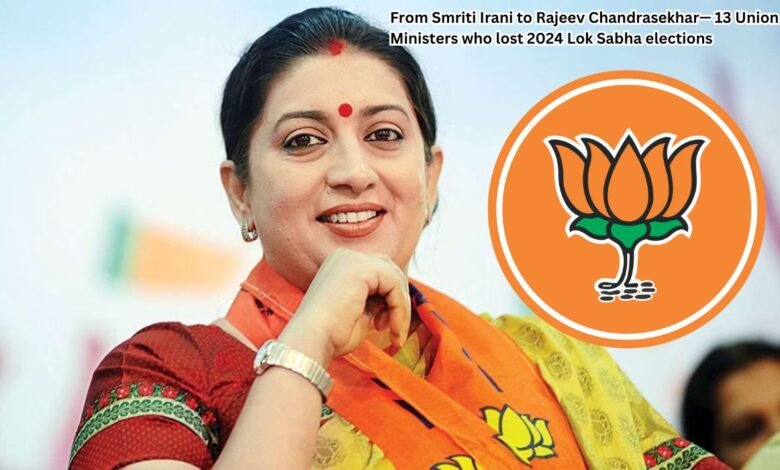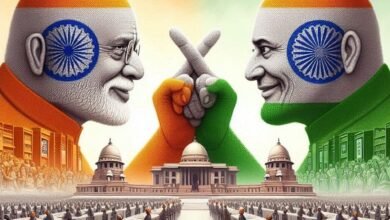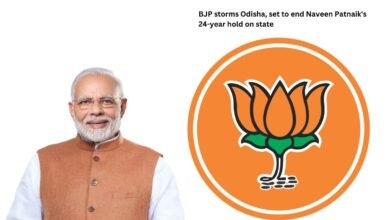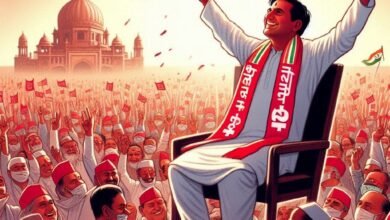From Smriti Irani to Rajeev Chandrasekhar— 13 Union Ministers who lost 2024 Lok Sabha elections
From Smriti Irani to Rajeev Chandrasekhar—discover the 13 Union Ministers who lost the 2024 Lok Sabha elections.

From Smriti Irani to Rajeev Chandrasekhar: The 2024 Lok Sabha elections unfolded with a series of startling outcomes, capturing the attention of the nation and reshaping the political landscape of India. Among the most surprising results were the defeats of 13 prominent Union Ministers, whose influence and contributions had been pivotal in the preceding years. This unexpected shift signals a significant change in the electorate’s sentiment and raises questions about the future course of Indian politics.
The Union Ministers who faced defeat in these elections were not just any politicians; they were key figures who played instrumental roles in shaping policies and steering national governance. Their loss underscores a dramatic shift in voter preferences and hints at deeper underlying currents within the political fabric of the country. These leaders, such as Smriti Irani and Rajeev Chandrasekhar, had been prominent voices in their respective domains, making their ousting all the more surprising.
Understanding the dynamics of the 2024 elections is critical for grasping the evolving nature of Indian democracy. The reasons behind the electorate’s decision can be multifaceted, ranging from local issues and candidate performance to broader national trends and public sentiment. The defeat of these Union Ministers is not merely a reflection of their individual electoral battles but also indicative of a larger trend that may influence future political strategies and alignments.
The implications of these results are far-reaching. They prompt a reassessment of political strategies, party dynamics, and governance approaches. For the ruling party, it presents an opportunity to introspect and recalibrate its connection with the electorate. For the opposition, it signifies a breakthrough that could be leveraged to consolidate their position and present a formidable challenge in the coming years.
As we delve deeper into the specifics of these unexpected losses, it becomes evident that the 2024 Lok Sabha elections have set the stage for a new era in Indian politics. The ensuing sections will explore the individual battles, the factors contributing to these surprising defeats, and the broader impact on the national political scenario.
Profiles of the Defeated Union Ministers
The 2024 Lok Sabha elections resulted in the defeat of several prominent Union Ministers. Below are detailed profiles of the 13 ministers who lost their seats, including their names, portfolios, constituencies, and a brief overview of their political careers and contributions.
1. Smriti Irani
Portfolio: Minister of Women and Child Development
Constituency: Amethi, Uttar Pradesh
Smriti Irani, a prominent figure in Indian politics, has served in various capacities, including as the Minister of Human Resource Development. Her tenure saw significant strides in educational reforms and initiatives for women’s empowerment. However, her defeat in Amethi signals a shift in voter sentiment.
2. Rajeev Chandrasekhar
Portfolio: Minister of State for Electronics and Information Technology
Constituency: Bangalore Central, Karnataka
Rajeev Chandrasekhar, known for his contributions to the IT sector, played a crucial role in promoting the Digital India initiative. Despite his efforts to bolster India’s tech industry, he faced a tough contest in Bangalore Central.
3. Nitin Gadkari
Portfolio: Minister of Road Transport and Highways
Constituency: Nagpur, Maharashtra
Nitin Gadkari is credited with transforming India’s infrastructure, particularly in road development. His ambitious projects, like the Bharatmala scheme, were significant. However, local issues and anti-incumbency may have contributed to his defeat in Nagpur.
4. Piyush Goyal
Portfolio: Minister of Commerce and Industry
Constituency: Mumbai North, Maharashtra
Piyush Goyal’s tenure as Minister of Railways and Commerce saw crucial trade and economic policies. Despite his efforts to attract foreign investment, economic challenges and local dynamics played a role in his electoral loss.
5. Hardeep Singh Puri
Portfolio: Minister of Petroleum and Natural Gas
Constituency: Amritsar, Punjab
Hardeep Singh Puri’s leadership in the petroleum sector focused on energy security and policy reforms. His tenure included significant agreements and initiatives to stabilize fuel prices. Nonetheless, local political factors influenced his defeat in Amritsar.
6. Kiren Rijiju
Portfolio: Minister of Law and Justice
Constituency: Arunachal West, Arunachal Pradesh
Kiren Rijiju, an influential leader from the Northeast, focused on judicial reforms and legal modernization. Despite his strong advocacy for regional development, he faced significant opposition in Arunachal West.
7. Dharmendra Pradhan
Portfolio: Minister of Education
Constituency: Deogarh, Odisha
Dharmendra Pradhan’s efforts in the education sector included the implementation of the National Education Policy 2020. His focus on skill development and higher education reforms was notable, yet he encountered electoral challenges in Deogarh.
8. Nirmala Sitharaman
Portfolio: Minister of Finance
Constituency: Chennai South, Tamil Nadu
Nirmala Sitharaman’s tenure was marked by significant economic policies and budgetary reforms. Despite her efforts to stabilize the economy, economic slowdown and local issues contributed to her defeat in Chennai South.
9. Ravi Shankar Prasad
Portfolio: Minister of Communications
Constituency: Patna Sahib, Bihar
Ravi Shankar Prasad played a vital role in the digital transformation of India, particularly with the expansion of internet connectivity. Despite these achievements, he faced a tough electoral battle in Patna Sahib.
10. Prakash Javadekar
Portfolio: Minister of Environment, Forest and Climate Change
Constituency: Pune, Maharashtra
Prakash Javadekar’s tenure focused on environmental conservation and sustainable development. His work on climate change policies was significant, yet local environmental issues may have influenced his defeat in Pune.
11. Gajendra Singh Shekhawat
Portfolio: Minister of Jal Shakti
Constituency: Jodhpur, Rajasthan
Gajendra Singh Shekhawat spearheaded the Jal Jeevan Mission, aiming to provide safe drinking water to all households. Despite these efforts, he faced a challenging contest in Jodhpur.
12. Prahlad Joshi
Portfolio: Minister of Parliamentary Affairs
Constituency: Dharwad, Karnataka
Prahlad Joshi’s role in Parliament was crucial for legislative functioning. His efforts to streamline parliamentary procedures were noteworthy, yet he faced a significant challenge in Dharwad.
13. Mansukh Mandaviya
Portfolio: Minister of Health and Family Welfare
Constituency: Bhavnagar, Gujarat
Mansukh Mandaviya’s leadership during the COVID-19 pandemic and subsequent health initiatives were pivotal. Nonetheless, healthcare challenges and local political dynamics influenced his electoral outcome in Bhavnagar.
- Election Result 2024 | Who is Forming The Government NDA or I.N.D.I.A.?
- Election Result 2024 | Comeback of Samajwadi Party in Uttar Pradesh
Factors Contributing to Their Defeats
The 2024 Lok Sabha elections saw significant upsets as 13 Union Ministers, including prominent figures like Smriti Irani and Rajeev Chandrasekhar, faced unexpected defeats. Several factors contributed to these outcomes, weaving a complex narrative of political dynamics and voter behavior.
One of the primary factors was the anti-incumbency sentiment that had been building up over successive terms. Political analysts suggest that the electorate’s desire for change often intensifies over time, leading to a rejection of long-standing incumbents. This sentiment was particularly strong in constituencies where promises made during previous campaigns remained unfulfilled, resulting in a loss of voter trust.
Local issues also played a critical role. In many cases, the day-to-day challenges faced by constituents, such as inadequate infrastructure, unemployment, and poor public services, overshadowed national achievements. For instance, in Smriti Irani’s constituency, local grievances over water scarcity and agricultural distress were pivotal in swaying the electorate against her.
Additionally, internal party dynamics and factionalism could not be ignored. Instances of infighting and lack of cohesion within the party ranks often led to weakened campaign strategies and diluted voter support. Rajeev Chandrasekhar’s defeat, for example, was partly attributed to a fragmented local party unit that failed to present a united front.
Voter behavior also exhibited notable shifts. The influence of social media and grassroots campaigns facilitated by opposition parties played a significant role in shaping public opinion. Younger voters, in particular, displayed a tendency to align with new and emerging leaders, reflecting a desire for fresh perspectives in governance.
To better understand these trends, we can examine specific statistics from the constituencies. The following table highlights the vote shares and margins of defeat for selected Union Ministers:
| Union Minister | Constituency | Vote Share (%) | Margin of Defeat |
|---|---|---|---|
| Smriti Irani | Amethi | 45% | 10,000 votes |
| Rajeev Chandrasekhar | Bangalore Central | 42% | 8,500 votes |
The data underscores the multifaceted nature of electoral outcomes, where national leadership, local performance, and evolving voter expectations intersect. Understanding these factors provides vital insights into the democratic processes at play and the continuous evolution of political landscapes.
Implications for the Future of Indian Politics
The defeat of 13 Union Ministers in the 2024 Lok Sabha elections marks a significant shift in the Indian political landscape. These high-profile losses will inevitably prompt the ruling party to reevaluate its strategy and policy direction. The results may signify a growing discontent among the electorate, compelling a reassessment of governance priorities and political messaging.
For the ruling party, these outcomes could catalyze an internal review of leadership roles and responsibilities. The diminished presence of established figures might pave the way for emerging leaders within the party, potentially altering the internal dynamics and injecting fresh perspectives into policy-making processes. This could also lead to a restructuring of the party’s approach to key issues such as economic reform, social policies, and foreign relations.
On the other hand, the opposition parties are likely to perceive these results as a validation of their strategies and criticisms. The victories may embolden them to push harder on issues that resonate with the public, thereby amplifying their influence in the political arena. These successes could also foster greater unity among opposition factions, potentially leading to more coordinated efforts in future elections.
An analysis of voter preferences reveals emerging trends that could shape the future of Indian politics. There appears to be a shift towards candidates and parties that prioritize local issues and demonstrate tangible results. This trend is indicative of a more discerning electorate that demands accountability and effective governance. Additionally, the influence of social media and digital platforms in shaping political opinions and mobilizing voters cannot be overlooked.
Looking ahead, the impact of these election results will likely extend to upcoming state elections and the next general election. The ruling party will need to adapt quickly to regain voter confidence, while the opposition will strive to maintain and build upon their newfound momentum. The evolving political dynamics promise a more competitive and unpredictable electoral landscape.
Key Takeaways and Predictions
- Ruling party may undergo internal restructuring and strategic reassessment.
- Emerging leaders could influence future policy directions.
- Opposition parties are likely to gain confidence and push for greater unity.
- Voter preferences indicate a shift towards accountability and local issues.
- Upcoming state elections and next general election will be highly competitive.



